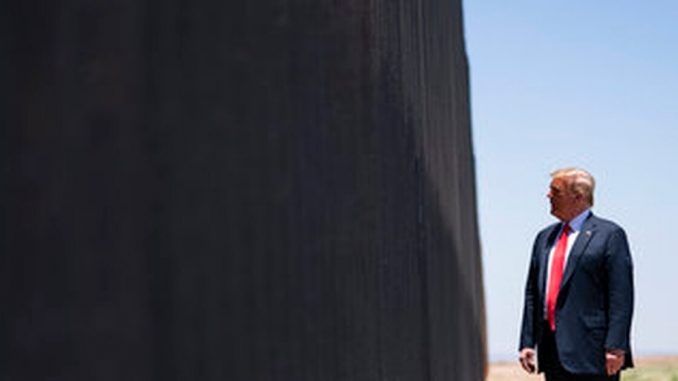
SAN FRANCISCO (AP) — A federal appeals court on Friday ruled against the Trump administration in its transfer of $2.5 billion from military construction projects to build sections of the U.S. border wall with Mexico, ruling it illegally sidestepped Congress, which gets to decide how to use the funds.
In two opinions, the 9th U.S. Circuit Court of Appeals agreed with a coalition of border states and environmental groups that contended the money transfer was unlawful and that building the wall would pose environmental threats.
The rulings were the latest twist in the legal battle that has largely gone Trump’s way. Last July, the Supreme Court allowed the $2.5 billion to be spent while the litigation continued, blunting the impact of the latest appeals court action.
The administration has already awarded much of the money, including a $1.3-billion job in Arizona that was announced last month. Trump visited Yuma, Arizona, on Tuesday to mark completion of the 200th mile of border wall during his administration, much of it with the transferred military funds that the 9th Circuit panel found illegal.
After the $2.5 billion transfer of military funds, the Pentagon diverted another $3.6 billion that an appeals court in New Orleans ruled in January could be spent.
/cloudfront-us-east-1.images.arcpublishing.com/mco/XANXA4Z4TNHSTMLNYMK6G62B7M.jpg)
Still, critics of Trump’s wall praised the rulings on Friday for upholding the Constitution, which grants Congress the power of the purse.
“The funds that he is pilfering, which were appropriated by Congress, are vital to support the safety and well-being of the brave men and women in uniform, as well as their families,” said House Speaker Nancy Pelosi, a California Democrat.
The 9th Circuit ruled that the Trump administration not only lacked the authority to authorize the transfer of funds, “but also violated an express constitutional prohibition designed to protect individual liberties.”
The vote on both rulings was 2-1 with judges appointed by former President Bill Clinton in the majority and a Trump nominee dissenting.
The panel said the government was proceeding with border wall construction without ensuring compliance with any environmental regulations, thereby harming the interests of Sierra Club members who visit the border region for hiking, bird watching and other recreational activities.
The panel also held that the government failed to show that construction would halt the flow of illegal drugs. It said the administration had cited drug statistics but didn’t address how the wall would have an impact on the problem.
“The executive branch’s failure to show, in concrete terms, that the public’s interest favors a border wall is particularly significant given that Congress determined fencing to be a lower budgetary priority and the Department of Justice’s data points to a contrary conclusion,” the majority wrote.
The White House said the decisions won’t interfere with its ability to continue building the wall and noted that the Supreme Court has overturned many of the court’s rulings.
After the Supreme Court gave the green light last year to begin work on the wall using Defense Department money, the Justice Department vowed to continue to defend the administration’s efforts to protect the southern border.
California Attorney General Xavier Becerra, who led a 20-state coalition of attorneys general that sued the administration, praised the court decision.
“While the Trump administration steals public funds to build an unauthorized wall at the southern border, families across the country are struggling to pay their bills,” Becerra said. “They deserve to know that their hard-earned dollars are going where Congress intended — to benefit them and their communities.”
The American Civil Liberties Union, which sued on behalf of Sierra Club and Southern Border Communities Coalition, said if the Trump administration appeals, the case will go back to the Supreme Court where the ACLU will seek to tear down sections of the wall that were built with the military money.
“There’s no undoing the damage that’s been done, but we will be back before the Supreme Court to finally put a stop to this destructive wall,” said ACLU staff attorney Dror Ladin.
___
Associated Press writers Jill Colvin at the White House, Brian Melley in Los Angeles and Elliot Spagat in San Diego contributed to this report.


Be the first to comment